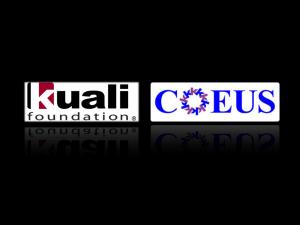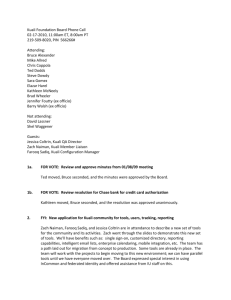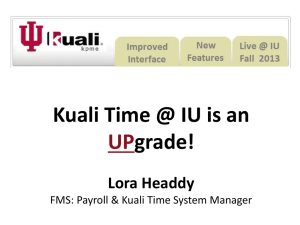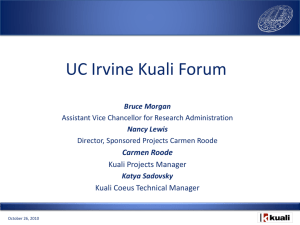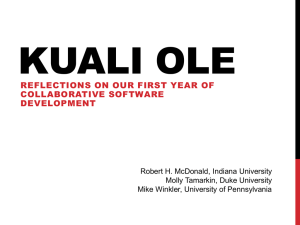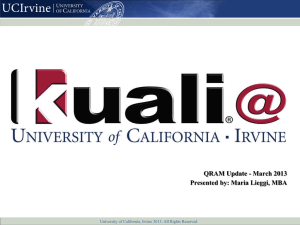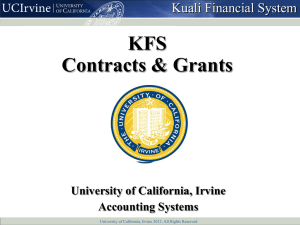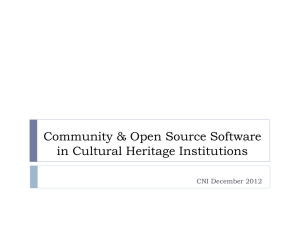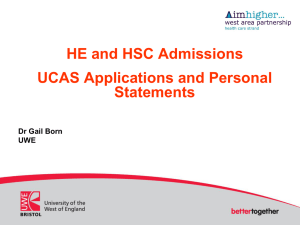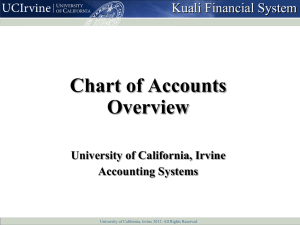Student Accounts - University of Toronto
advertisement
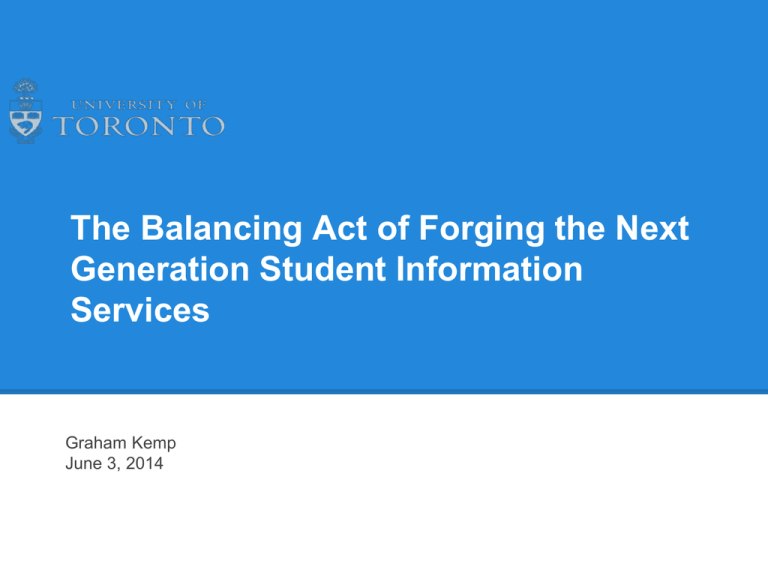
The Balancing Act of Forging the Next Generation Student Information Services Graham Kemp June 3, 2014 Next Generation Student Services - A Guided Tour Agenda • • • • • • Overview - University of Toronto Background – Next Generation Student Information Services Our thinking of the way forward Strategy and projects Major NGSIS projects which are underway Introduction to KUALI Next Generation Student Services - A Guided Tour University of Toronto at a Glance Enrollment: 83,156 (2013) 3 campuses: Downtown Toronto (St. George), Mississauga (in the west) and Scarborough (in the east) Undergraduate programs: 700+ Graduate programs: 215 Professional programs: 63 Staff and faculty: 18, 860 Alumni (up to Fall 2013) : 530,000 Operating budget (2012-2013): $1.8 billion EASI - Enterprise Applications and Solutions Integration CIO Program Director KS Director EASI Manager Tech Svcs Manager FIS Manager Telecom Manager UTBI Manager HRIS Program Director NGSIS NGSIS PM Manager SIS Project Teams (5) Manager Web Major Initiatives: RAISE TOP NGSIS UTBI eProcurement Invoice Workflow KUALI Enrolment Academic Services Challenges with Current SIS • Implemented in 1998 – Major focus on registration • Architecture • Lacked much of the functionality required now and in the future • • • • • Many manual interventions and processes Mainframe Software AG - Natural Language Performance Cost U of T Student System - Current State Student Web Service 294,000 logons first day of classes SIS 48,000 distinct users first week of classes 1.8 million lines of code 7,750 programs 700 batch jobs External systems e.g. 200 system interfaces Administrative 1,200 users 300 concurrent 450 tables 100 GBs of data 10-15 million database calls per hour during busy times in year 70 power users depend on ROSI data 20 divisional systems depend on ROSI data 1000+ Shadow Systems OUAC AMS Blackboard Bank payments Security Going Forward • We did not want to just replace the current SIS – ROSI • Create a renewed and expanded suite of student information services • Serving not only students but faculty and staff • We selected a Hybrid approach • • • • Package Solutions Local Development Community/Open Source Collaborative Initiatives Going Forward • To be phased in over multiple years while maintaining and improving current service levels • Probably the largest single project undertaken at the UofT • Daunting challenge • • • Requires patience Understanding Confidence • We must take care while stepping down the current SIS KIM 9 NGSIS Governance Executive Steering Committee Executive Sponsors CIO Program Director NGSIS Core Team Academic Lead Program Advisory Groups Process Streamlining Functional and Technical Teams Strategy 2013 • Build credibility • • Emphasis is on short • term service improvements • • Initiate large scale change projects • 2014 2015 Capitalize on credibility • Implement selected large scale change Emphasis is on large projects scale change projects • Continue to provide Implement technical targeted service infrastructure improvements Continue to provide targeted service improvements Continually Evaluate Progress Year 1 & 2 (2012 – 2014) Focus on Short Term Service Improvements over 30 new improvements Main SIS SAP added Student Web Service • • • • One Stop Registration Status Enhance Transcript Service Improve Invoice Format Personalised Calendar Personalised Exam Schedule Safety Abroad Address Improve UHIP process Automate Residence Financial Interface Fix Summer Fee calculations Add New Financial Reports Course Finder Degree Explorer Manage Residences Extend Campus Map Choose Residence Co-curricular Record Find Text Books Transfer Credits Join Varsity Team HR, Finance Research Ontario Market Share Recruitment Course Enrolment Program Enrolment Student Performance Strategic Plan 2013 3 Tier Plan 2014 2015-16 Service Improvements: Over 30 new service improvements for students and staff Large Scale Change: • • • • • Participation in KUALI community source development Curriculum Management - KUALI Improvements to students accounts ACORN student web service Implement Development Instance of KUALI Enrolment • • • • Expanded system hours Hardware improvements Enable live connections to the main system for divisions Build the new infrastructure Technical Improvements: What is KUALI? • Consortium of Universities working together to build community open source systems specifically for Higher Education • Developed and supported by a dedicated community • Institutions can take advantage of the development with open source licensing agreement • Modular nature allows integration with legacy and vendor soluions • KCAs – rSmart, Sigma, OpenCollab Project Plan: 2014 - 2016 Person (2%) (student) Awards (5%) Degree Audit (3%) Convocation (2%) ACORN SAP Admissions (12%) New Student Web Service Enrolment (24%) Kuali Development Student Accounts Tuition & Incidental Fee Calculation (11%) HR, Finance Research SAP Student Accounts Common programs (26%) Curriculum Management Courses & Programs Common resources (9%) courses, org structure, degree, subject posts Common technical and security components (7%) Large Scale Projects Underway Demonstrate Hybrid Model • Accessible Campus On-line Resource Network - ACORN • Student Accounts • Curriculum Management • Business Intelligence ACORN • Evolve services as new on-line resources and tools are available to the students and staff • New visual design and branding • Allow for future integration of key products • Selected registration improvements • • Pre-requisite warning Registration “preplanning” shopping cart • Mobile platform • On track for the first release in the Fall of 2014 Can I transfer my credits? FOM FOM Graduate Graduate Students Graduate Students Students 20 Help me to choose my residence… Graduate Students I’d like to compare my residence choices… Mobile – Responsive Design • Menu view • Reformats popular dashboard features • Reformats most popular menu options for mobile device Student Accounts • Total Students – 83,012 • 150 different combinations of academic and incidental fees • 885 distinct ancillary fees • Generates >8 million financial transactions annually • > $186 million in scholarships, fellowships and bursaries • >$945 million in student fees Student Accounts Issues • • • • • • Inconsistent rules and/or lack of options to manage deferral of fees Limited ability to offer different payment and refund options No ability to apply payment to specific fees Inconsistent and/or lack of rules to retroactive registration charges; • Undergraduate leaves • Administrative error • Compassionate relief Parents who pay tuition cannot access invoice and payment information Not able to reconcile ROSI to the financial system Student Accounts – Investigation of Issues Process Streamline (requirements) reports completed by Financial Services: Financial Counselling Residence Fees Graduate Awards Disbursements Undergraduate Award Disbursements Educational Assistance Undergraduate Academic Fees Graduate Academic Fees Incidental Fees Academic Billing (Oct 2013) Over 250 issues identified Student Accounts – Phase 1 • Adoption of SAP Student Accounts module with some customization for reporting • Provides a replica of the student account within the SAP financial system • Allows full reconciliation between SAP and ROSI • Allow use of SAP standard reporting • Less configuration of systems • Less duplication of data and keeps our options open for future KUALI deliverables including KSA UTBI A comprehensive reporting repository of the students lifecycle and a flexible toolset for analysis of that information • Empowerment • • Provide flexible, self service access to student data Broaden distribution to data to those who need it • Evidence based decision making • Facilitate better planning • Efficiency • Reduce data gathering and analysis from days to minutes • Single version of the truth Today’s Reporting UTBI Repository SIS HRIS Data Warehouse Procurement Spending Degrees Awarded RIS Pro Student Enrolment (MTCU) Graduate Student Income FIS HR Research Student Housing OUAC Admissions UofT Admissions Course Enrolment Program Enrolment Program Performance Other Cognos BI Tools Analytical Reporting Degree Explorer Admissions to Graduation Lifecycle What is our share of Ontario high school graduates? How many stay and graduate? Retention Analysis Lets compare admissions to performance … Admissions to Performance Program Performance How do they do? Ontario Market Share Admissions Where are they admitted? Course and Program Enrolment What programs & courses do they take? Future Projects? Expand Repository to collaborate with: Degree Explorer Retention Analysis Admissions to Performance Program Performance Ontario Market Share Co-Curricular More Self Service Options MyRes Mobile BI Student Accounts Executive Dashboard & KPIs Admissions Course and Program Enrolment SGS Reports Course Evaluations Predictive Analytics KUALI Participation - UofT • • • • • We are investing/contributing to the development of these KS products We are replacing some key parts of ROSI with KS products as part of the NGSIS hybrid approach Current focus of KS development is Enrolment; this is a high priority for the University We are implementing Curriculum Management Providing staff for development of Course Offering and Registration KUALI Advantages • Cost • Stronger set of functionality • Specifically designed for Higher Education • Service Oriented Architecture • Modular in design • Collaborative nature of the development Challenges • Many partners • Getting our requirements on the table and prioritized • Fluidity of partner resources • Timing and scheduling • Changing the development culture at UofT KS KUALI Organization - Student Structure U of T Contribution Board Functional Council Project Advisory Group Program Director Program Coordinator Functional Director Development Manager QA Manager Principal Product Manager Product Managers Analysis Team Lead Lead Architect Services Architect UX Architect PDT Leads Core Analysis Team Core Technical Team Core Services Team Core UX Team PDTs Core QA Team Curriculum Management • Curriculum management provides the structure and facilitates creation and modification of the curricular catalog • • • • • • • Automated workflow and approval for proposals User initiated course creation, modification and retirement Version control Rules to relate courses to each other and programs Provides search capability on key words in the title and body Viewing interdependencies Comparing versions of courses and programs with highlighted differences Curriculum Management – Eco-system Implement undergraduate A&S Develop ecosystem of products to support a single source of program and course information for the U of T Course & Program Screens Search, Browse, Propose, Approve • ROSI/NGSIS • Divisional Calendars CM Database source of courses & programs update program status from Sakia Source for: view rules from Degree Explorer 36 Rajiv Kaushik Program Director – KUALI Student KUALI Student: Student System Solutions Already Making a Difference McDougall 249 at 11:15 Challenges • • • Building and keeping momentum with continuous improvement Keeping sponsors and user community engaged When do we start transitioning to new system? • • • • • • • • • Will it meet the requirements and expectations? What do we need to build locally? As we build/extend the KUALI modules do we contribute back/ Cultural changes for development Timelines Business process and best practice Complexity of the University of Toronto Balancing resources and budget to meet all the demands As we implement new services - sustainment Questions Graham Kemp – graham.kemp@utoronto.ca Cathy Eberts cathy.eberts@utoronto.ca Rajiv Kaushik rajiv.kaushik@utoronto.ca
